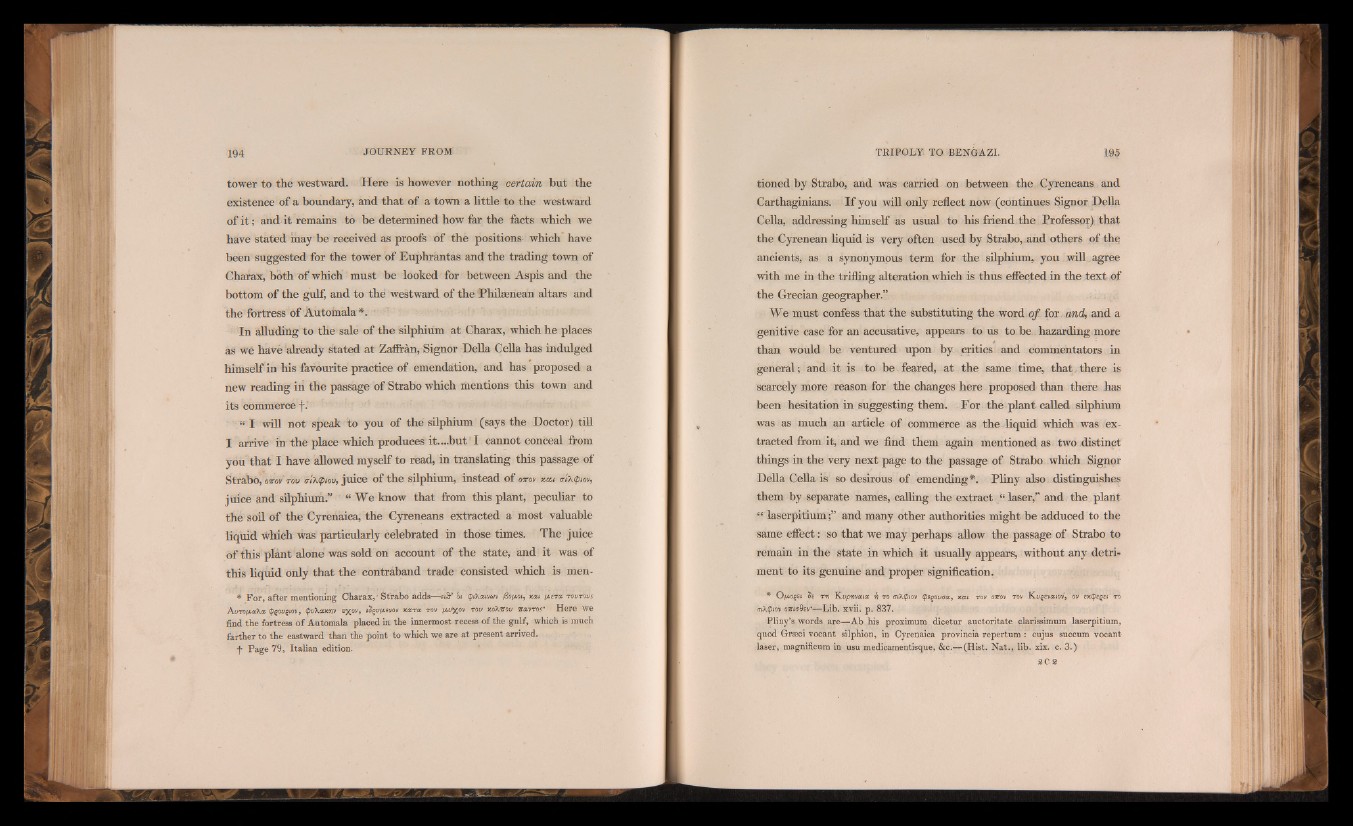
tower to the westward. Here is however nothing certain but the
existence of a boundary, and that of a town a little to the westward
of it; and it remains to be determined how far the facts which we
have stated may be received as proofs of the positions- which have
been suggested for the tower of Euphrantas and the trading town of
Charax, both of which must be looked for between Aspis and the
bottom of the gulf, and to the westward of the Phikenean altars and
the fortress of Automata *.
In alluding to the sale of the silphium at Charax, which he places
as we have already Stated at Zaflran, Signor Della Celia has indulged
himsdf in his favourite practice of emendation, and has proposed a
new reading in the passage of Strabo which mentions this town and
its commerce | j |
“ I will not speak to you of the silphium (says the Doctor) till
I arrive in the place which produces it. ...but! I cannot conceal from
you that I have allowed myself to read, in translating this passage of
Strabo, oirov tov irixcpiov, juice of the silphium, instead of orov xai atXcpiov,
juice and silphium.” “ We know that from this plant, peculiar to
the soil of the Cyrenaica, the Cyreneans extracted a most valuable
liquid which was particularly celebrated in those times. The juice
of this plant alone was sold on account of the state, and it was of
this liquid only that the contraband trade consisted which is men-
* For, after mentioning Charax, - Strabo adds—si&' hi <fi\amim /Sojtoi, xai ¡xtm tovtous
AurofjuxXa ^goagiov, Qv\ixKHV exovs i\vfX£Voi xxrx rov /jt,o%pv xou xoKvov vxvros' Here tve
find the fortress of Automala placed in the innermost recess of the gulf, which is much
farther to the eastward than the point to which we are at present arrived.
-f- Page 79, Italian edition.
tioned by Strabo, and was carried on between the Cyreneans and
Carthaginians. If you will only reflect now (continues Signor Delia
Celia, addressing himself as usual to his friend, the Professor) that
the Cyrenean liquid is very often used by Strabo, and others of the
ancients, as a synonymous term for the silphium, you will agree
with me in the trifling alteration which is thus effected in the .text of
the Grecian geographer.”
We must confess that the substituting the word of ior and, and a
genitive case for an accusative, appears to us to be hazarding more
than would be ventured upon by critics and commentators in
general; and it is to be feared, at the same time, that,there is
scarcely more reason for the changes here proposed than there has
been hesitation in suggesting them. For the plant called silphium
was as much an article of commerce as the liquid which was extracted
from it, and we find them again mentioned as two distinct
things in the very next page to the passage of Strabo which Signor
Della Celia is so desirous of emending*. Pliny also distinguishes
them by separate names, calling the extract “ laser,” and the plant
“ laserpitium;” - and many other authorities might be adduced to the
same effect: so that we may perhaps allow the passage of Strabo to
remain in the state in which it usually appears, without any detriment
to its genuine and proper signification.
* O/xogei Se m K vpaivocta rt t o ciAlpiov (fispovaat, x a i toy oirov toy Kygevaiov, ov ex<p£§£i to
atXtptov O9TK70SV* Lib. xviii p. 837.
Pliny’s words are—Ab his proximum dicetur auctoritate clarissimum laserpitium,
quod Graeci vocant silphion, in Cyrenaica provincia repertum : cujus succum vocant
laser, magnificum in usu medicamentisque, &c.—(Hist. Nat., lib. xix. c. 3.)
2C2